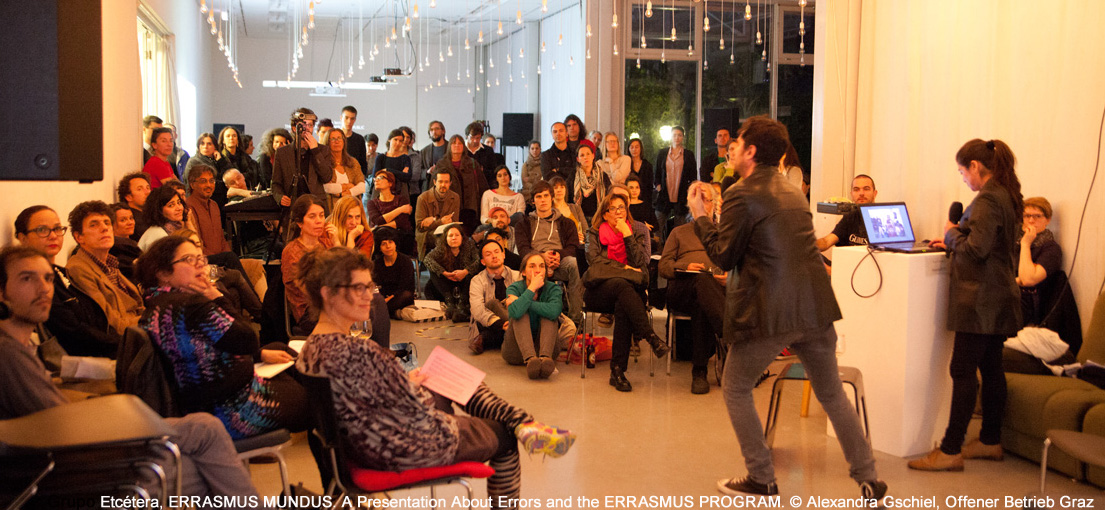A Decentralized Academy – Workshop with Stephan Dillemuth
I participated in the workshop “A decentralized Academy” to learn more about the history and former visions surrounding the issue in Graz. It was the only theoretical workshop dedicated to exploring the meta question of the symposium. Stephan Dillemuth discussed with the participants what former quests and concepts for a decentralized academy from 1996*4 *(4) are still relevant today, what has changed, and possible starting points in the present.
Around twenty participants from various fields joined the workshop. Nevertheless, the presence of a group of eight students from the “free class” of the Academy of Fine Arts Vienna directed the discussion for a while around questions of how to change and transform art institutions from inside (e.g., with concepts such as the “Freie Klasse,” which emerged during the university protests “uni:brennt“” in 2009 and has since allowed participants from outside the academy to join the class’ lectures).*5 *(5)
Sabeth Buchmann, head of the Institute of Art Theory and Cultural Studies at the Academy of Fine Arts in Vienna, joined the workshop and offered her experiences from the 1990s, when she was a young cultural worker. Similar to Stephan Dillemuth, she highlighted the importance of her experience with self-organization in the arts scene in Germany at that time.
Nonetheless, their conclusions about the subjective experiences of self-organization differed: while Dillemuth underscored that his experience of running an autonomous arts space together with other artists had been of utmost importance for him in learning and sharing knowledge, Sabeth Buchmann pointed out that self-organization should not be romanticized, since informal hierarchies must be consciously reflected. She claimed that one should be open to both self-organized and institutional structures.
However, due to lack of time and the fact that most workshop participants were not local, the discussions culminated in concrete suggestions on how to proceed with the idea of a decentralized academy in the city of Graz.
Prospect
A decentralized academy would not produce art for the market, but would assert an understanding of art as critical practice and as a mode and mood of trying to develop autonomous and sustainable models of living on a regional basis. This vision might include – as Stephen Dillemuth pointed out during his workshops – a kind of “tinker- economy,” which would combine producing objects and immaterial artistic work, both merging into the political. This raises the key questions of “How do artists as well as non-artists make a living?” and “Where are potential points for organizing solidarity?”
Surprising at the gathering in Graz was that the symposium participants represented only part of the arts field, thus indicating that the process of constituting an open and decentralized educational structure in Graz linking the arts and grassroots activism must still endeavor to bring together the stakeholders of the different fields in order to imagine on a larger scale what this decentralized academy might look like as a joint project.
Laila Huber ( 2014): Thoughts about a Decentralized Academy in Graz – (Un)Learning Contemporary Art?. In: p/art/icipate – Kultur aktiv gestalten # 05 , https://www.p-art-icipate.net/thoughts-about-a-decentralized-academy-in-graz-unlearning-contemporary-art/



 Artikel drucken
Artikel drucken